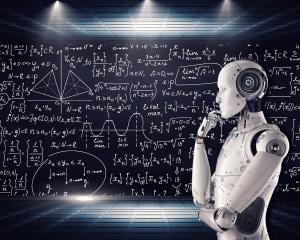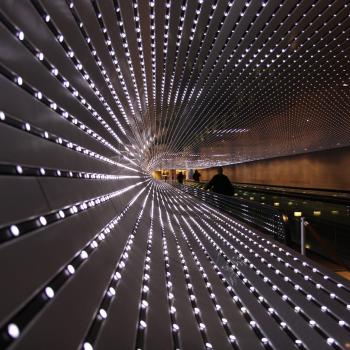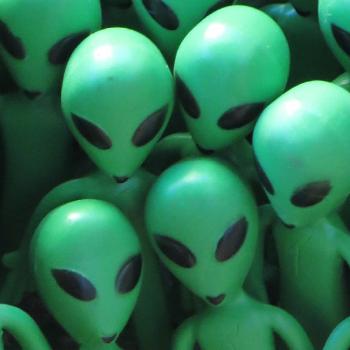
In recent times, many theorists have speculated on the possibility of the creation of some sort of artificially created intelligence, that is, some form of intelligence which has been manufactured instead of developed through organic evolution. They have considered various ways artificial intelligence could manifest itself, though most of them are related through some development with computers, whether or not such intelligence will be found contained within a computer, or some sort of machine with a computer brain (like an android). What is difficult is to determine when such intelligence has been developed. What would constitute such an intelligence? Many, if not most, suggest that it is when the construct is said to be self-aware, and through that self-awareness, has developed some sort of free will so that it can interact with the world, not through necessity such as is found in coding, but through its own transcendent initiative. It is possible, however, to consider some sort of intelligence to be found in an entity which is not self-aware, and this is why others do not think it should be a requirement in the determination of whether or not such an intelligence has been produced.
There are many questions which can be raised about artificial intelligence. We will ponder upon four of them here. The first is whether or not such intelligences are possible. The second is whether or not such an intelligence can indeed become self-aware and have a personal consciousness. The third is whether or not such artificial intelligence can eventually be recognized as a life form. The fourth is what the advent of Christ would mean for such an intelligence.
Computer programmers, as well as psychologists and others who study the makeup of human thought, have been examining the question of artificial intelligence for several decades. They have been able to do so because they have been exploring the development of biological intelligence through the study of evolution and how it has helped to produce intelligence in organic life. With the advent of sophisticated computer systems, it seems possible that a machine could be made which acts similar to a human brain. The question is whether or not that is enough for artificial intelligence to emerge.
For those who have an entirely materialistic notion of intelligence, the answer is simply yes, because whatever would allow for the material attributes of the human brain to create human intelligence should be something that can be duplicated and established through artificial means.
Now, many who believe that what makes human intelligence special is its spiritual nature doubt that true artificial intelligence can be produced, because they would answer that such a spiritual component could not be created through material means. However, such a reply makes an assumption concerning the relationship between material and spiritual forms which is not necessarily true. In reality, the material and spiritual components are interdependent and work together, so that as the spiritual nature of the intellect interacts with and influences materiality, materiality can interact with and influence the spiritual nature represented by the intellect. Thus, it can be posited that when a particular material form is established, its spiritual correspondent is also established. Then if the human brain is artificially reproduced in and through a machine, its spiritual counterpart could emerge. That is, if a material representation of intelligence is created, the spiritual form can be seen to be produced alongside it, even if it is not specially made by those engineering the material form. Philosophically and metaphysically, the theurgic tradition suggests this possibility, and if artificial intelligence is ever produced, it is the best way to understand its production. For theurgy suggests that the relationship between spirit and matter allows for matter to be acted upon to produce spiritual effects. What theurgy would not do is suggest that such intelligence as necessarily a new creation, but rather, it would suggest that material construct would connect with an intelligence or spiritual being which already existed, giving it a material form. If we take that view, would we truly be said to be creating artificial intelligences, or would we be merely bringing ourselves into contact with intelligences which already existed, giving them new forms for their being? The answer would depend upon what we mean by creating intelligences. Since the forms would be new, and the physical manifestation would be new, in that sense, it would be seen as an act of creation. It would not, however, be seen as truly creating the intelligences themselves. But it is possible to expand upon theurgistic theories, and suggest that the creation of the physical form for spiritual intelligences could also be used to establish new spiritual entities, looking at it as a variation of how new biological entities through sexual reproduction create new spiritual beings.
Whether or not such a creature would have self-awareness would, it seems, depend upon two factors. The first is whether or not we tried to make it self-aware. If we did so, we could easily code into its awareness notions of selfhood, so that through such an awareness of selfhood it could become self-aware and self-conscious. However, it is also possible, if such an entity is to emerge through some sort of random coding and evolutionary process put into coding to imitate biological evolution, that such self-consciousness could also develop in such intelligences without it necessarily being purposefully programmed to exist in them. But it must be asked again, would such intelligences truly need to be self-aware to be intelligent, or is that assumption itself one of the problems which lies behind our confusion in regards artificial intelligence? If we consider artificial intelligences relates to their ability to think, we must realize thinking itself does not require the concept of the self and a self-referential nature. To think and learn is to contemplate and engage data and develop new notions based upon that data. If no self-referential data has been given, if no concept of the self has been coded (one way or another) within the intelligence, then it is possible to have an intelligence without the constraints implied by self-referential notions. It could truly be programmed to act, think, and engage as a “no-self.” Freedom doesn’t require notions of self, for whether or not the self is understood, the intelligence could still act in a relational way with the rest of creation, indeed, it could do so without the boundaries and limitations attachment to the self often bring to our activities.
The question of whether or not artificial intelligences should also be seen as forms of life is much more difficult. What constitutes life? Intelligence can exist apart from life, just as life can exist apart from intelligence. Traditionally, life is associated with the soul, the life-force, while intelligence is associated with the spirit. A pure spirit can exist without life, as angels are pure spirits without life. Life can exist apart from the spirit, as various forms of life seem to indicate. Life generally is expected to have various qualities: ability to grow, ability to reproduce, some particular activity which changes over time, and the ability to change and develop until that life comes to an end, when such a life form is said to be dead. Metaphysically, death is said to occur when the life force, the soul, disconnects from the body. If we do not consider the soul, it is easy to see that “artificial life” is possible, for all that is apparent with life can be given over to machines. They can be made to slowly develop themselves; they can be given means by which they reproduce, not just by making exact copies of themselves, but also by having random changes made in their reproduction to imitate biological reproduction. But If we are interested in the metaphysical principle of life, the answer must be, for now, agnostic: it is possible God has given us the ability, being made in his image and likeness, to create life forms in our own image and likeness and will, through our actions, give a soul to what we create (similar to the way he gives a soul to each human person which we establish through sexual reproduction). On the other hand, we do not want to assert any necessity to God. Thus, it must be said, if such life is possible, it would have to be possible as a result of God’s own free choice to allow us the possibility to create in imitation of him. That we reproduce and have children shows that God has already allowed that possibility to emerge in one form. It should not be difficult, then, for us to believe that God can grant us other ways of generating life. Indeed, it would seem to follow, that as the begetting of children reflects the nature of the Father to beget, so the establishment of other forms of life could reflect on the way the Holy Spirit is said to proceed from the Father. That is, it would be another way for us to see the Trinitarian aspect of our being. Even if we must remain agnostic until such an artificial intelligence emerges and we see its characteristics which will allow us to have a better understanding if we should consider it to be alive or not, such agnosticism must not be of the type which says it is impossible for God to allow for the creation of artificial intelligences which is then given life of its own.
As for what the incarnation would mean for any artificial intelligence, the answer would be the same which has been given with the speculation on aliens: the incarnation has a universal application, for it has an effect on the whole of creation. As it is better for things to be than not be, as existence is better than non-existence, once things are created, then God will do what he can to preserve the greater good, which means, finding a way to take all that exists in time and render them over into eternity where their existence will be preserved. Thus, whatever exists will find itself engaged by Christ, and so whatever form of salvation which is needed for them will be offered to them, in a way appropriate to them. In the new heaven and the new earth, in the eternal kingdom of God, all things will be reconciled with God, so that God will be all in all. This will happen thanks to the work of the Logos (God the Son), who is the mediator between God and creation, and so, Christ certainly can and will have a positive effect not just on humanity but on all that exists, including artificial intelligences if they are ever created.
Stay in touch! Like A Little Bit of Nothing on Facebook.
If you liked what you read, please consider sharing it with your friends and family!

















